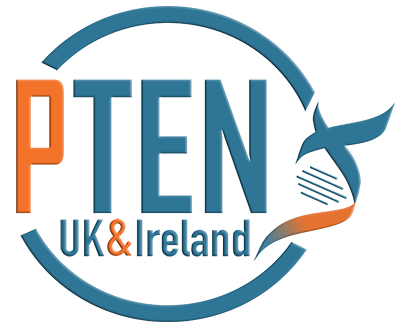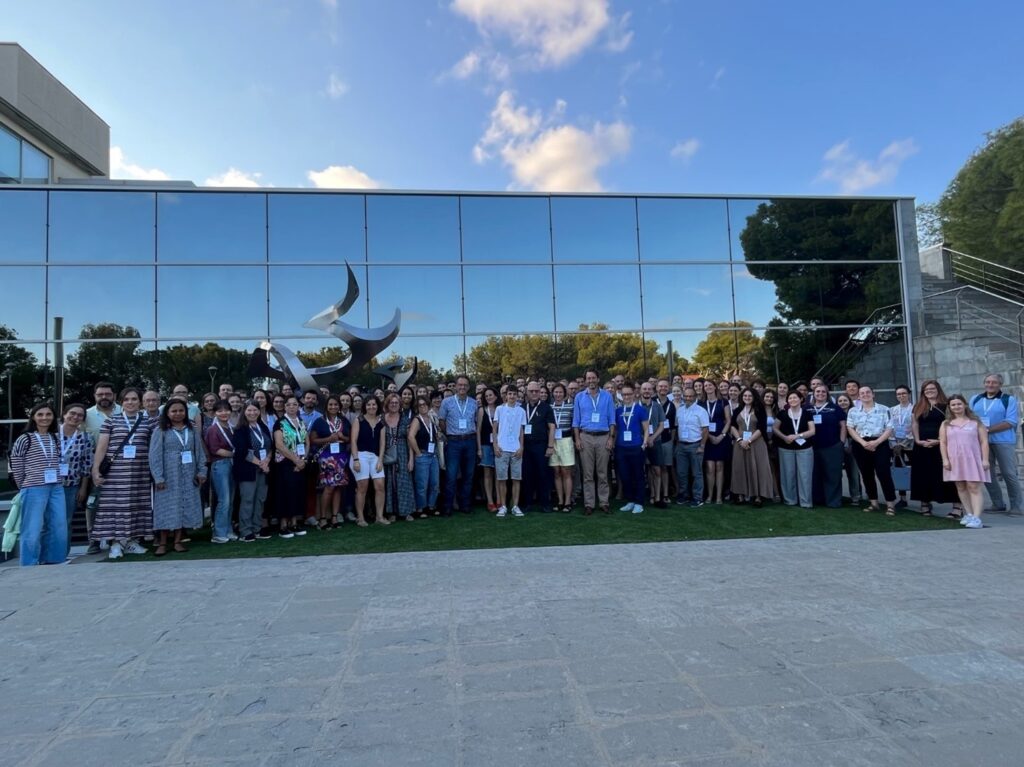In September our trustees Ellie and Priyanka had the opportunity to represent PTEN-UKI at ‘The PI3K-AKT-mTOR-PTEN pathway: a new era in basic research and clinical translation’ conference in Barcelona which focussed on cell signalling pathway that PTEN is a part of. The conference was attended by researchers, clinicians and people from pharmaceutical companies.
The event had talks from professionals both young and experienced and the topics ranged from how proteins like PTEN work to do their job, to the various drugs that have been developed to treat conditions such as cancer caused by mutations in these genes. There was also a session focussed on rare diseases caused by mutations of genes of the PI3K-AKT-mTOR pathway.
We learnt that just like PTEN hamartoma tumour syndrome (PHTS) is caused by mutations in PTEN, certain other rare diseases can result from mutations of other genes in the same signalling network. Activated phosphoinositide 3-kinase delta syndrome) (APDS) is a rare, inherited condition that affects the way the immune system works. The most common symptoms of APDS are frequent upper respiratory tract infections, sinus infections, ear infections, bronchitis and pneumonia (lung infection). PROS (PIK3CA-related overgrowth spectrum) includes a group of genetic disorders that leads to overgrowth of various body parts. These patients, like PHTS patients, can also develop vascular malformations. Tuberous Sclerosis (TS) is a rare genetic disease caused by mutations in the TSC gene which causes non-cancerous (benign) tumours to grow in the brain and several areas of the body, including the spinal cord, nerves, eyes, lung, heart, kidneys, and skin. SHORT syndrome and APDS2 are both due to mutations in the PIK3R1 gene. While common features of SHORT syndrome include short stature, hyperextensibility of joints, ocular depression, Rieger anomaly and teething delay, APDS2 has similar features to that of APDS such as frequent respiratory tract infection. It was fascinating that all the genes which are a part of the same biological pathway could cause such diverse range of syndromes in humans.
There were a few talks about PTEN and the charity had an opportunity to speak to the presenters. Professor Bart Vanhaesebroeck from UCL, who gave the keynote lecture and was also one of the organisers of the event, runs a research group at UCL which focuses on PTEN research. It was his idea to invite patients to these professional events to bridge the gap between the patient and professional communities.
Dr Mariona Graupera, a researcher at Josep Carreras Leukaemia Research Institute, Barcelona, focuses on vascular malformations (VMs) in PHTS and PROS. Her research has showed that the VMs in both PHTS and PROS are similar, pointing towards common elements in development of these VMs and how this can be used for advancements in treatments.
“Having the opportunity to interact with patients has allowed us better to understand the disease and in turn provided an extra layer of motivation to find a cure”.
Dr Mariona Graupera
Her close associate Dr Sandra Castillo focuses exclusively on PHTS and she spoke about her research on understanding the cause of VMs using mouse models and patient samples.
Georgia Constantinou, a PhD student at UCL, presented her research on understanding the immune system related issues in PHTS patients. Dr Priyanka Tibarewal, our research trustee, who is also a PTEN researcher at UCL, presented her results from pre-clinical studies aimed at cancer prevention in mouse models of PHTS. It was impressive to hear about all the efforts into understanding the cause of and developing cures for the various manifestations of PHTS.
Dr Paul Elvin from PTEN Research gave an overview of the foundations work to fund such lifesaving research.
We also spoke to Dr Anita Chandra who is an immunologist consultant from Cambridge. She told us that PHTS patients can have issues with their immune system such as recurrent infections of the chest, ear and sinuses.
‘if you have PHTS and have constant infections or are constantly on antibiotics, you can ask your GP to refer you to an immunologist’.
Dr Anita Chandra
The event also had representatives from the pharmaceutical companies who spoke about the process of drug development and the hurdles they face before a drug can be given to patients. It was impressive to see the tremendous efforts that go into bringing new treatments to patients.
Of particular interest to PTEN UKI was the talk from Professor Joseph Bateman from Kings College London who spoke about the ‘mTOR Pathway Diseases node’ which is a part of a £14 million initiative by the National Institute of Health and Care Research (NIHR) and the Medical Research Council (MRC) to coordinate and address tractable challenges in rare diseases. PHTS is a one of the diseases of the mTOR pathway. When we asked Joe what the overall benefits of this project are,
We will establish mTOR pathway diseases as a coherent patient population. This will be supported by researchers and clinicians with the resources for basic research and partnerships to develop new diagnostic tools and drug trials, to benefit patients and their families. Over five years we will transform the mTOR pathway disease landscape in the UK’
Professor Joseph Bateman
One of the aims of this programme is to work with patient representatives to organise patient public involvement and engagement activities for the mTOR pathway disease community. The node will host a workshop for charity representatives to encourage engagement with the node and discuss how mTOR pathway diseases link these charities and the benefits of grouping these diseases for understanding the causes, diagnosis, and treatment. PTEN UKI will be participating in this initiative, and we hope that our patient community benefits from this.
Towards the end of the conference Ellie was invited to join a panel discussion where patients were able to share their perspectives with the professionals in the audience. This was a real privilege and something that is happening more often at these sort of research meetings. The audience touched on topics such as how patients stay on top of their care and how this can be improved, the journey to diagnosis and how they can communicate science better to patients.
Overall, the meeting was a huge success and PTENUKI were thrilled to be invited to take part. We made great connections going forward and look forward to continuing to report more about the research happening in our field.
‘When patients, and their families and carers,attend scientific conferences, it can have mutual benefits for the patients and researchers. Patients can find conferences empowering, as they are able to get a deeper understanding of their condition and learn about the efforts being made in research and the newest developments in treatment. The opportunity to interact with scientists themselves can also give context to the process behind the research. For scientists, discussing the patients’ experiences living with the condition alongside the current research can also provide them with context and lead to new perspectives. Scientists may then consider new priorities for their research, so patients can sometimes influence research in a direct way when attending conferences.’
Catherine Heath, Biochemical Society
Useful links:
The event website can be found at https://www.eventsforce.net/biochemsoc/frontend/reg/thome.csp?pageID=89299&ef_sel_menu=1134&eventID=174
You can find information about PTEN Research Foundation at https://www.ptenresearch.org/
For further information, please email
Kelly Kearly: kelly@ptenuki.org
Ellie Challis: ellie@ptenuki.org
Priyanka Tibarewal: priyanka@ptenuki.org

